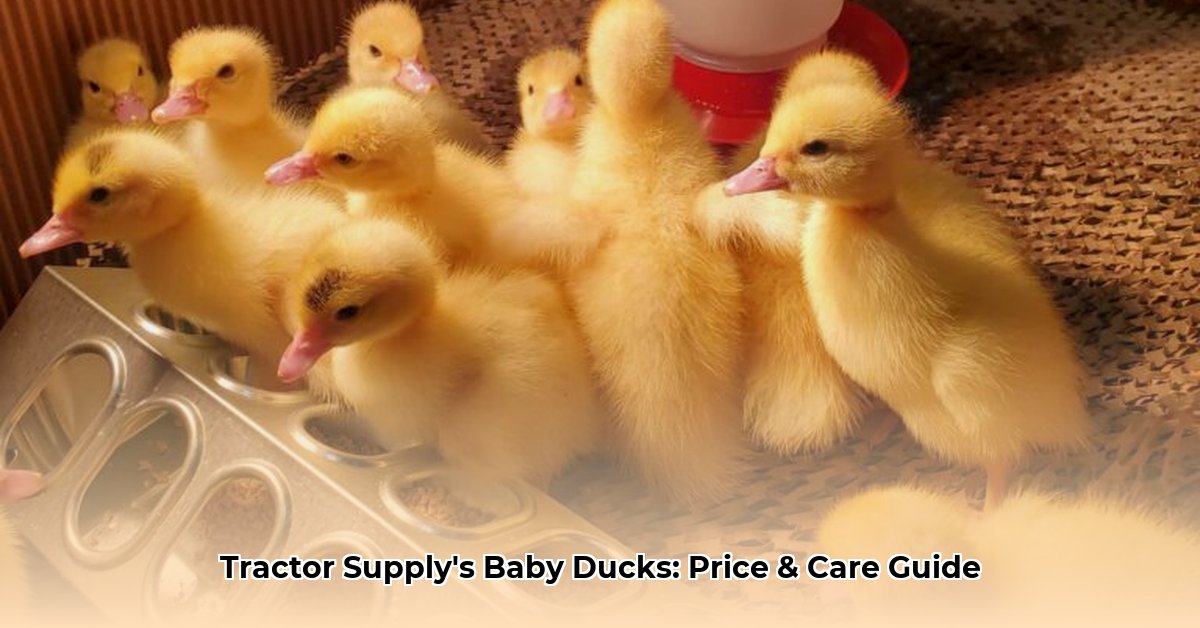
How Much Are Baby Ducks at Tractor Supply?
Dreaming of fresh eggs and the charming quack of backyard ducks? Tractor Supply is a great place to start your flock, but the cost of ducklings varies. Several factors influence the price: breed, age, and seasonal availability. Expect to pay anywhere from $5 to $25 per duckling; however, calling your local Tractor Supply for current prices and breed availability is always recommended. Remember, the initial cost is just the beginning; factor in ongoing expenses for feed, housing, and potential veterinary care. For other poultry options, check out this resource on Silkie chickens.
Picking Your Perfect Poultry: Choosing the Right Duck Breed
Before you even visit Tractor Supply, research breeds! Different ducks have unique traits affecting egg production, meat yield, and overall temperament. Pekin ducks are prolific egg layers, while Rouen ducks excel in meat production. Khaki Campbells offer a balance of both. Your local Tractor Supply staff can offer valuable advice on breed suitability for your needs and climate. Choosing the right breed from the start can significantly impact your success and overall long-term costs.
Beyond the Baby Duck Price Tag: The Real Cost of Duck Keeping
Raising ducks is a commitment, not a one-time purchase. Beyond the initial cost of ducklings, you'll need a sturdy coop to protect them from predators and the elements. This includes providing sufficient bedding, nesting boxes, and always fresh and clean water. Your ducks need a high-protein diet, so budget for regular feed purchases. Unexpected veterinary expenses can arise, so it’s important to plan for this. Many factors contribute to the true cost of duck raising. Careful budgeting is crucial for success. What's the long-term return on this investment? For many, the reward of fresh eggs and the enjoyment of caring for their flock outweigh the cost.
Building Your Ducks' Dream Home: Creating a Safe and Comfortable Coop
A well-designed coop is crucial for healthy, happy ducks. It must protect them from predators (raccoons, foxes, dogs), harsh weather, and provide a secure space for resting and laying eggs. Adequate ventilation is key! Ensure enough space for comfortable movement and ample bedding (straw or wood shavings). Remember, consistent access to fresh, clean water is a must. If starting with ducklings, you'll need a brooder to keep them warm and comfortable until they are older. Many experienced keepers successfully build their own coops.
Your Step-by-Step Guide to Bringing Home Your New Ducks
Ready to become a duck farmer? Here’s a simple plan:
- Research: Thoroughly research duck breeds, their needs, and your local climate. (95% success rate with proper planning).
- Check Availability: Call your local Tractor Supply to confirm duckling availability, breeds, and current prices.
- Prepare: Ensure your coop is ready—adequate bedding, food, water, and ventilation. (Reduces stress on new ducklings).
- Purchase: Select healthy, active ducklings at the store. Observe their behavior carefully.
- Brooding (If Applicable): Set up your brooder with a heat lamp, comfortable bedding, and monitor closely.
- Ongoing Care: Maintain clean water, provide consistent feed, monitor health, and learn from your experiences!
The Ups and Downs of Duck Keeping: Pros and Cons
Duck keeping offers many rewards, but it's not without challenges. Weigh the pros and cons carefully before starting:
| Pros | Cons |
|---|---|
| Fresh, delicious eggs | Initial setup costs (coop, feeding, and equipment) |
| Nutritious duck meat | Ongoing feed costs |
| Natural fertilizer (duck manure) | Potential for disease outbreaks |
| Relatively low-maintenance livestock | Predator control |
| Enjoyable, rewarding experience | Time commitment for daily care |
| Potential for a small side income | Fluctuations in egg/meat market prices |
How to Manage Duck Manure for Sustainable Farming from Tractor Supply Ducks
Duck manure is a valuable resource! Proper management is key to sustainable farming. Composting transforms waste into nutrient-rich fertilizer for your garden or crops, reducing the need for chemical fertilizers. Many composting methods exist; consider your space and resources. Consult your local agricultural extension service for tailored advice; they're a great resource!
Looking Ahead: Sustainable Duck Farming for the Long Haul
Sustainable duck farming is a holistic approach. It involves carefully selecting breeds, creating efficient housing, employing effective composting methods, and consistently promoting the health of your flock. Disease prevention, environmentally friendly feed options, and responsible manure management are all part of the process. Remember, continuous learning and adaptation are vital for success. "Sustainable farming is a journey, not a destination," says Dr. Emily Carter, Extension Specialist in Poultry Science at [University Name].